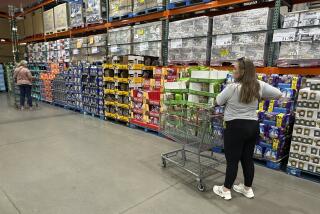Consumer Sentiment Dives in 1st Post-Katrina Survey
- Share via
Consumer confidence suffered its biggest drop in 15 years in September as Hurricane Katrina made Americans anxious about the rising costs of heating their homes and filling their gas tanks. The decline raised questions about consumer spending for the rest of this year, including the holiday shopping season.
Meanwhile, the government reported Tuesday that sales of new homes plunged in August by the largest amount in nine months, continuing a string of mixed signals about the health of the housing boom.
The Conference Board said its consumer confidence index, compiled from a survey of U.S. households, dropped 18.9 points to 86.6 from a revised reading of 105.5 in August.
That marked the biggest slide since October 1990, when the index fell 23 points to 62.6 during a recession. This month’s reading of confidence was the lowest since October 2003, when the index registered 81.7.
Analysts had expected the September reading to be 98.
The Commerce Department said new-home sales fell 9.9% last month to a seasonally adjusted annual rate of 1.24 million units. Even with the slowdown, the median sales price rose 2.5% from July’s level to $220,300. The bigger-than-projected drop in new-home sales could signal that the nation’s red-hot housing market is starting to slow down, but reports so far are mixed.
The drop in consumer confidence, which followed an unexpected gain in August, was more jolting, raising more concerns about shoppers’ ability to spend in the crucial fall and holiday seasons with gasoline prices expected to remain at $3 per gallon. The high pump prices stem from tight supplies and the fact it may take weeks to restart refineries that closed because of Hurricane Rita.
Even before Katrina slammed into the Gulf Coast on Aug. 29, consumers were struggling to fit higher gasoline prices into their budgets, with that strain showing up in August’s modest retail sales gains. Sales have been disappointing again this month, and analysts are concerned that consumers will further retrench when they start paying home heating bills.
Economists closely track consumer confidence because consumer spending accounts for two-thirds of U.S. economic activity.
“Today’s numbers show that consumers are not very optimistic about the economy. As a result, we will see consumer spending reduced until we see some relief on energy prices,” said Gary Thayer, chief economist at A.G. Edwards & Sons. He added, “If we don’t get some relief, it looks like it will be a very weak holiday season.”
Scott Hoyt, director of consumer economics, at Economy.com, was more upbeat about consumers, warning against reading too much into September’s confidence figures. He noted that the key fundamentals for spending -- employment and income -- are holding up.
Although there have been job losses along the Gulf Coast as a result of Katrina’s fallout, economists predict overall healthy job gains of 169,000 when the Labor Department reports its figures Oct. 7.
More to Read
Inside the business of entertainment
The Wide Shot brings you news, analysis and insights on everything from streaming wars to production — and what it all means for the future.
You may occasionally receive promotional content from the Los Angeles Times.










